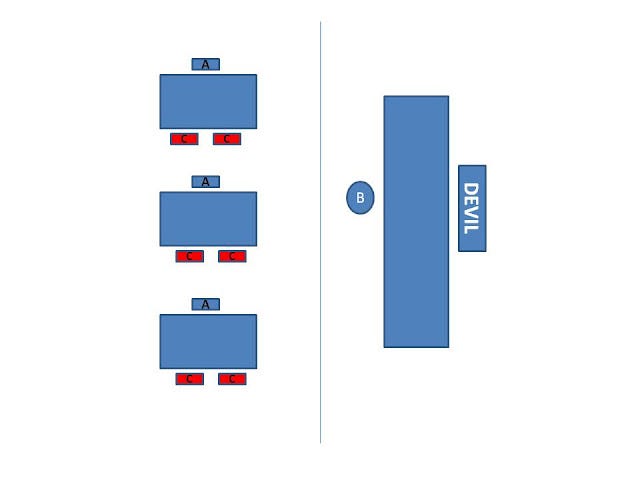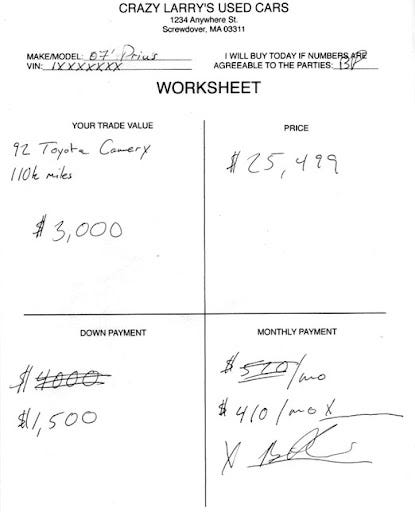Car Dealers 101
There are a few things you have to do in preparation for buying a car from a dealer, especially if you care for your dollar.
- Read this post in full
- Read Artful Persuasion by Harry Mills (ISBN 978–0814470633)
- Read Art of War by Sun Tzu (ISBN 978–0813319513)
- Remember the game rules for Chess
No, this is not a spin. Dealing with a car dealer can be one of the most overwhelming experiences there can be and at some level or the other, they — the dealers — will get you. I have always been told in my management training programs that the customer is the 900-pound-gorilla. But in a car-sale transaction, the dealer is the 900-pound-gorilla. It is not without a reason that these people are typified to be the “used car salesmen”. Oh yes, people dealing with used cars (as opposed to new cars) are even more aggressive.
Here are a few things you need to know when it comes to buying cars — whether new or used — from a dealer.
Even in a seller’s market, car dealers are trained to do one thing. All their training, all their motivation, all their incentive plans drive them to do one thing — not let you leave the dealership until you have a new set of keys in your hands. They will please you, intimidate you, outsmart you, make serious deals with you, beg you — do just about everything legal — so you bite the bullet and sign the contract.
See the picture below. Though dealerships (think of the office space) may be different in size or shape, they all will have one thing in common. The different small desks meant for customers to sit (the red boxes marked C is where you sit, the blue box marked A is where the dealer sits). Think of the blue long line I drew as a glass wall. Literally, it is a glass see-through wall. The guy who sits behind the big table in that room is somebody who is very important. I will tell you who it is….I promise. Read on.

So, lets say you go to a dealership and see a car. Or may be a few cars. Old, new — whatever. The guy who welcomes you to the dealership is the guy who will eventually sit in the “A” spot. During the time you are outside the office premises of the dealership, he actually does an amazing job of taking you to the cars you want. You give a hint, he will make sure you see the car and he will offer to give it to you for a test drive. Typically the dealer’s viciousness is very limited, if that. But once you have seen the cars you want, when you have indicated to the dealer what type of cars you are looking at (a signal which is usually pretty obvious to the dealer, based on your initial picks) — he takes you into the office space. Seats you at the “C” spot and he sits at the “A” spot. He now offers coffee, soda whatever. Makes you feel important.
He draws an imaginary skeleton of you (your potential trade-in car, your choice of cars, your preferences, your down-payment ability etc…). He will ask you a question at this point. He is required to. “Will you buy the car today, if I were to agree to ALL YOUR terms and conditions?” Hey, this is a straight forward question. There is no reason why your answer should not be a “Yes”. After all, it is your terms and conditions, right? Read on.
Now he walks past the glass wall, to position B and talks to the guy across the table from him. They have a small-talk which you cannot hear and he walks back to you and tells you that this deal is not viable. That’s it. He just said it. Guess what — this is a deliberate attempt to crush your ego and to tell you that you are not good enough to achieve your own dream. You can’t even buy the car you wished. Now you freak out, ask him about various options. He walks back to position B and talks to the guy across the table. They both come back to you with a piece of paper. This is what the paper will look like this:

As you can see, this is supposed to capture trade value, purchase value, down payment and monthly payment. This is called the “four square” and it forms the basis of your negotiation exercise with the dealer. Infact, the dealers are trained to show this paper to you for a split-second and fold it in such a way that you only see the bottom-half (down payment and monthly payment). In his cut-throat transaction, the trade-in and the value of the car truly have no value. He plays you only on the other two things. Remember, the first time you see the numbers written here, it is a figment of his imagination. He will tell you how carefully he arrived at this value, based on your merits — but it is purely his imagination. What he wants to do is show you some official-looking document, upon which — at some point — he will ask you to sign. This legally means nothing — but makes you ink your initials — firming up your commitment. All the negotiations you do and he does from this point on, will be rewrites of the numbers in the bottom two squares.
He will demerit your car: Even if you have a beautiful car in good condition, he will play it down and make it sound like it is worth nothing
He will insult your ego: He will claim that your business does not even matter to him or his company. Your business is too profit-unattractive. Whatever he makes off your purchase is only good for a meal or buying an underwear or some such thing.
He will upsell his product: Especially if your target car is a used car, he will completely conceal from you the very same (negative) attributes which would bring the value of the car, if you were selling it.
He will confuse you: With finance options. You bargain on downpayment, he will play with your monthlies. You play with monthlies, he will offer to take the trade-in off the table. You offer a total cash deal, he will act as if your dollar is not important.
Keep in mind, this is a warfront, this is a chess game, this is manipulation and mind-winning game.
Here are few things you can do to keep your position or atleast get the best out of him:
- Don’t appear interested in any car in particular
- Be prepared to walk-away without a flinch, at any point of time
- Don’t appear interested in the one car you are really interested in
- Be prepared to walk-away without a flinch, at any point of time
- Don’t be lured by finance options — the only thing that counts is how low he can get the price to
- Be prepared to walk-away without a flinch, at any point of time
- If you are trading in, don’t let him know that until you have a satisfactory price on the car you are buying
- Be prepared to…….you get the idea
- Just remember that you are the customer, you are the one having dollars to spend and refuse to be played
- If it’s a new car you are buying, unless you are careful, you are going to spend a lot on additional accessories, warranties
- Don’t pay too much for things like color etc…
- Find out what your credit score is, before you walk-in to the dealership
- Better yet, have a loan pre-approved before you walk-in
- Be prepared to walk-away without a flinch, at any point of time
- 0% APRs are not. Be careful.
- Manufacturers themselves give discounts and cashbacks. Don’t give them to your dealer.
- With cars and with everything else, just remember that — when you are the one shelling out the dollars — you have the power of choice and no deal is worth getting desperate about.
Happy shopping. Play safe.
Fine print:
- In addition to this post and Harry Mills and Sun Tzu, you can google up a lot. The more you read, the better you will be prepared.
- Dealers want to stay in business. While they will be aggressive in sales pitches and sometimes very aggressive, their practices will generally be within confines of law. However, some dealers also engage in illegal/unethical practices which I have not covered in this post.